- Home
- Keith R. A. DeCandido
DIPLOMATIC IMPLAUSIBILITY Page 5
DIPLOMATIC IMPLAUSIBILITY Read online
Page 5
“I believe, in Commander Riker’s lexicon, that truly means that he would love it.”
Again, Crusher laughed. “That’s certainly true.”
The bartender came back with Worf’s drink, which had been sufficiently heated, to Worf’s relief. He put the plate down on the bar and grabbed the mug. He took a gulp and felt the hot liquid burn pleasantly in his mouth. A warm feeling started at the base of his throat and started to spread to his chest and head. Even better, it wasn’t a syntheholic drink. While humans—who had spent millennia cooking all the flavor out of their food—did not have sufficiently discerning taste buds to distinguish alcohol from synthehol, Klingons could. While Worf would drink synthehol if he had to—while on duty, for example—he greatly preferred the real thing, and this was definitely it. A few more sips, he thought, and I might even be able to stand this music.
Next to him, Crusher’s face grew serious. “Worf, I—I just wanted to let you know that—if you ever want to talk about—well . . .”
“About what?” Worf finally asked when Crusher’s hesitant pause threatened to go on forever.
“Jadzia. With someone who’s been there.”
And then Worf understood. “Odan,” he said.
The doctor nodded.
Like Worf, Crusher had fallen in love with a joined Trill. Like Worf, Crusher had to watch the host body die, and then have the symbiont live on in another that she could not love.
“Doctor—Beverly—”
Crusher let out a bark of laughter. At Worf’s surprised look, she said, “Sorry, it’s just that Odan called me ‘Dr. Beverly.’”
“Ah. In any event, I appreciate the offer.”
“But you won’t take me up on it.”
In fact, Worf had no intention of taking her up on it, but he had hoped he had not been that obvious about it. “Doctor—”
“Will’s not the only one who’s easy to read by someone who knows him well enough,” Crusher said. “It’s okay. I honestly didn’t think you would want to talk with me. But I wanted you to know that the offer was on the table, in case you change your mind.”
Worf nodded. “Thank you, Doctor—truly, I am grateful. However, I have had over a year to come to terms with Jadzia’s death.”
“Sometimes that’s not enough. Believe me.”
The music came to a merciful halt, and then a voice rang out through Ten-Forward. “Everyone, may I have your attention, please?”
Worf turned toward the center of the room to see Captain Picard holding a glass of some kind of ale.
The room quieted down almost instantaneously. Jean-Luc Picard had that effect on people.
“Many of you here do not know Ambassador Worf personally, though surely you know him by reputation. He served aboard the previous Enterprise with distinction, then did likewise at Deep Space Nine, one of the most important strategic posts in the quadrant. Long ago, I said that the bridge wouldn’t be the same without him, and the last four years have proven that to be the case. But I also know that he has served both the Federation—which sometimes saw him as a curiosity and in which he was always to some degree an outsider—and the Klingon Empire—which twice saw fit to exile him from his own homeland—with honor. And now, those two august bodies have shown tremendous good sense in allowing him to serve them both as the Federation’s ambassador to Qo’noS. As one who has been his commanding officer, his cha’DIch, and his friend, I wish him well—but I do not wish him luck. For a warrior does not depend on luck, and Worf, son of Mogh, is first and foremost a warrior.”
Picard held his ale up. “So I ask you all to raise your glasses and join me in saluting the bravest man I have ever known. To Worf!”
A roomful of Starfleet officers, most of whom Worf had never met before tonight, raised their glasses and cried out, “To Worf!”
As they all drank, Worf held up his own glass. Perhaps this party won’t be so bad, after all . . .
Chapter Two
KLAG HAD TO ADMIT to being impressed with the sight on his viewscreen.
The Gorkon had been joined at the rendezvous point by the Sword of Kahless, Chancellor Martok’s new flagship, replacing the Negh’Var. Martok had informed Klag that he wished to brief the captain and the ambassador on the taD mission when the Enterprise arrived.
Klag had been less than thrilled with the High Council’s reply to his request for aid to Governor Tiral. To put the negotiations in the hands of a Federation ambassador who only got his position because he was a member of Martok’s own House angered Klag.
Toq’s voice sounded from behind him. “Captain, a Starfleet vessel is coming out of warp. Sensors identify it as the Enterprise. They are hailing us.”
Klag nodded. “On screen.”
The bridge of Starfleet’s flagship replaced the exterior of the empire’s on the viewscreen. Although most would have been honored to converse with Jean-Luc Picard, who nine years ago was the first outsider ever to serve as a Klingon chancellor’s Arbiter of Succession, Klag was much more interested in greeting the human who sat to Picard’s right.
Picard stood. “Captain Klag, greetings from the Federation. Ambassador Worf and his aide are ready to beam over at your convenience. Unless the presence of the Sword of Kahless indicates a change in the mission?”
“Thank you, Captain Picard. There is no change to the mission, and the ambassador’s aide can beam over at any time. However, Chancellor Martok wishes to brief the ambassador and me. Please transport him to the Sword of Kahless. I will meet him there in ten minutes.”
“Of course.”
Business concluded, Klag turned to look at Picard’s first officer. “It is good to see you again, Riker.”
Riker grinned with a face that was now inexplicably beardless. “Same here, Klag. It’d be good to have a chance to catch up. If nothing else, I’d love to hear about what happened to your arm.”
“That, my old friend, is a long story. Luckily, I have a case of bloodwine that will go quite well with long stories. With your captain’s permission, I will contact you when my business with the chancellor is concluded, and we can speak of old times.”
Picard nodded. “My permission is granted, Captain. In addition, my chief medical officer tells me she has an old comrade serving on your vessel.”
This news did not surprise Klag. B’Oraq, the Gorkon’s doctor, had studied medicine in the Federation. “She, too, may beam aboard at her leisure, Captain.”
“Thank you, Captain. Enterprise out.”
Klag rose from the captain’s chair. “Commander Drex, you are in command until I return from the Sword of Kahless.”
“Yes, sir,” Drex muttered.
“Is there a problem, Commander?”
Drex straightened. “None, sir,” he said with more authority.
“Good. See that that state of affairs continues.”
With that Klag left the bridge, followed by his own personal guard. The pair of them proceeded to the transporter room in silence.
Klag arrived in the Sword of Kahless’s much larger transporter room to see a Klingon as tall as Klag himself, wearing a brown tunic with silver trim under a gray vest decorated on either lapel with the Federation and Klingon Empire insignias.
“I am Klag, captain of the Gorkon,” he said as he stepped down from the platform. “On behalf of the Defense Force and the High Council, I welcome you, Ambassador Worf.”
Worf nodded. “Thank you, Captain. It will be an honor to be transported by one of the finest new vessels in the fleet.”
A bekk—the Defense Force equivalent of a noncommissioned security guard—stood in the doorway and said, “The chancellor awaits you both,” then led the way out of the transporter room.
The bekk took them through several corridors, bringing them further into the interior of the massive vessel. A guard was stationed at the door, and Klag’s guard joined him as the captain and Worf entered.
Only two others had served as head of the High Council in Klag’s lifetime, and Kl
ag had met them both. K’mpec had once traveled on the Baruk, on which Klag served as an ensign. He had seemed larger than life to Klag, a near-mythic figure who, at that time, had already served as chancellor longer than anyone in history. K’mpec carried himself as if he had been born to lead the empire, and the old warrior’s death had saddened Klag. Many years later, Klag had met Gowron, who had struck him as little more than a political opportunist who had schemed his way to the top. He had seemed born only to best serve himself rather than the empire.
Although Klag had, of course, served under Martok—every member of the Defense Force did during his tenure as Gowron’s chief of staff—he’d never met him until now. The man who got up from a chair far more ornate than any on which Klag had ever sat seemed to rank between the two extremes of his predecessors. He had none of K’mpec’s grandeur, nor Gowron’s self-importance—simply the face of a warrior, proudly bearing the scars of the Jem’Hadar blade that had cost him his left eye. The smile with which he greeted them was genuine.
“Worf!” Martok said as he rose. “It is good to see you again, my friend, as always.” He turned his one eye to Klag. “And the Hero of Marcan. It is an honor to have you aboard my flagship, Captain.”
To Klag’s surprise and delight, Martok actually sounded like he meant it. “The honor is mine, Chancellor. I simply won a battle. It was you who won the war.”
“We all won the war,” the chancellor said, “the empire, the Federation, and even the Romulans. We claimed victory through unity. And unity is what we must now discuss.”
Martok indicated two other chairs—far smaller, of course—as he sat back down in his own.
Turning to Klag, Martok said, “First of all, Captain, I wish to make something clear. Worf will be in charge of the mission to taD. From this point until the mission concludes, command is his.”
Klag leaned forward. This was not what he had in mind. “Chancellor—”
“You still command the Gorkon, and obviously Worf has no authority in any matters outside the purview of the mission—but the mission is his. Is that understood?”
Oh, I understand just fine, Klag thought bitterly. Youuse your influence unfairly, son of Mogh—as you did toobtain this position.
Another voice rang out in the back of Klag’s head: And what was it you used to ensure that the Gorkon escort the ambassador to taD in the first place?
Aloud, Klag said only, “Of course.”
“Good.” Martok turned back to Worf. “The situation on taD is difficult. All things being equal, I might consider allowing the al’Hmatti their independence.”
Klag blinked in surprise.
“But all things are not equal,” Martok continued. “Several conquered worlds have taken advantage of the war to foment their own rebellions. None are as far along as taD’s, nor may they be. If we grant taD freedom from our rule, it will be a sign of weakness, and encourage other worlds to wrestle for independence.”
Interesting, Klag thought. He had not known this bit of intelligence; he could hardly blame the High Council for keeping it quiet. He wondered what other worlds had attempted to throw off their overseers.
Martok leaned forward and looked at Worf. “Let me do you the honor of being blunt, Worf. Under no circumstances can I allow taD to be ruled by anyone other than Klingons. To do that would plunge the empire into a dozen conflicts at a time when we are attempting to rebuild a fleet. I will not be remembered as the chancellor who led the empire to victory over the Dominion only to lose a quarter of our territory to jeghpu’wI’.”
Worf nodded. “Thank you, Chancellor. It is my hope that a solution can be reached that will please all sides.”
“The only side that concerns me is that which will keep the empire intact.”
“Naturally. But I do not work for the empire. My first duty is to the Federation; my second to the alliance between the two governments. You may rest assured that I intend to serve both.”
And no mention of his duty to the House of Martok, Klag noted. I wonder if that is due to my presence.
Martok laughed. “You already sound like a diplomat, Worf. I’m sure that if anyone can find that solution, it will be you.” He leaned back. “Excellent. I’m glad that’s over with. Someday, my friend, I will find it in my heart to forgive you for turning me into a politician.”
Said Worf, “I have had no reason to regret my actions, Chancellor.”
“No, I suppose you haven’t,” Martok said with a snort. “Well, enough of this. Captain, again, it is an honor to have met you finally. And we will meet again at Ty’Gokor in a few months’ time.”
Klag fought to control his reaction. So, I will be inducted into the Order of the Bat’leth after all. He couldn’t help but direct a few smug thoughts in the direction of Kargan, in whichever afterlife was unfortunate enough to have him. “The chancellor honors me,” Klag said, rising from his chair. “With your permission, we will return to the Gorkon.”
“Not just yet. Oh, you’re dismissed, Captain, and may return to your ship. But Worf and I have other matters to discuss. Family matters.”
All the joy he felt at Martok’s pronouncement fled Klag. I was right. This entire show was for my benefit. The true business will commence after I leave.
Not wishing to show his anger in front of Martok—who was, after all, still supreme commander of the empire’s citizenry—Klag simply said, “As the chancellor commands.”
With that, he left, his guard following close behind.
Klag decided that his first impression of Martok needed to be revised somewhat.
The first time William Riker ever set foot on a Klingon ship, he was ten years old. After years of pestering his father to take him along on one of the assignments that took Kyle Riker away from home for long periods of time, Dad finally acquiesced—on a mission that entailed passage with the Klingons.
From the moment Will first beamed into the dark, funny-smelling ship full of large, foreboding creatures who seemed to spend all their time growling down at him, he was scared to death. He retreated to the tiny cabin assigned to him and Dad, sat on the metal slab that was supposed to be a bed, and hoped nobody would see him crying.
He never asked to go along with his father again. When he was older, and more cynical, Will figured that Dad chose the Klingon ship hoping for precisely that result.
Ten years later, as a cadet at Starfleet Academy, he went on a mission that required him to board a Klingon ship. It had taken all the fortitude his twenty-year-old self could muster not to cower in fear at the very idea.
Now, of course, he was over forty and beyond such things. He had spent plenty of time on Klingon ships and in Klingon space, ranging from a historic-if-brief tour as the first officer of the I.K.S. Pagh (the first time a Starfleet officer formally served as a member of a Klingon Defense Force crew) to more recent visits during the Dominion War.
But as he materialized alongside Beverly Crusher and Giancarlo Wu in the Gorkon transporter room, he couldn’t help but hear his ten-year-old self saying, “Dad, it’s dark in here!”
Waiting for them was Klag, once Riker’s second officer on the Pagh, now the captain of this ship. The two had formed a close friendship during Riker’s tenure on the Pagh, and they had stayed in sporadic touch ever since. After Riker’s departure, Klag had been made first officer, and had remained at that post for the decade following—an unusually long time for a Klingon to remain at one post.
Klag had changed over the years. For one thing, as Riker had noted before, he had lost his right arm. His straight, jet-black hair was now twice as long as the shoulder-length cut Riker remembered, and his goatée had grown in fuller. He still had the same eyebrows—upswept, even by Klingon standards—sharp nose, and penetrating black eyes.
Next to Klag stood a taller, lankier Klingon with a scowl on his face; this man had the insignia of a commander, so Riker figured he was the first officer.
“Welcome to the Gorkon, Commander Riker,” Klag said. He still had t
he same deep, resonant voice that Riker remembered.
“Thank you. This is Dr. Beverly Crusher, and the ambassador’s aide, Giancarlo Wu.”
The commander made a noise, and then muttered something under his breath. Riker didn’t catch all of it, but it sounded like something derogatory about humans.
In flawless Klingon, Wu said, “I have slept on plenty of metal slabs in my time, Commander. You needn’t worry about my well-being.”
Klag threw his head back and laughed the hearty laugh that had startled Riker out of ten years’ growth when he first heard it in the Pagh’s mess hall. “Well said, Wu.” Klag then turned to Beverly and said, “B’Oraq has been looking forward to seeing you again, Doctor.”
“Likewise,” Beverly said with a nod.
Klag said, “Commander Drex will escort you to the medical ward, and the ambassador’s aide to his quarters.”
Without preamble, Drex moved to the exit without bothering to see if Wu and Beverly followed. In a human, that would have been considered rude, but it was normal for Klingons. If you don’t have the brains to follow, you don’t deserve to be escorted in the first place, Riker thought with a smile. He had to admit to admiring the blunt simplicity.
Once the door closed behind Beverly, Klag turned to Riker and slapped him on the arm. “It has been a long time, my friend. Come, let us drink and remember old times.”
“Lead on,” Riker said, glad he had had the foresight to take an anti-inebriant before leaving the Enterprise. Bloodwine went right to his head.
* * *
For the first time in Beverly Crusher’s medical career, she walked into a Klingon medical ward without wincing.
Well, not wincing too much, in any case. . . .
The pitiful state of Klingon medicine had been a constant source of annoyance to Beverly, especially once she signed onto a ship with a Klingon officer whom she would be responsible for treating. Starfleet’s smallest emergency medikit was better equipped than the best Klingon hospital.

 Alien
Alien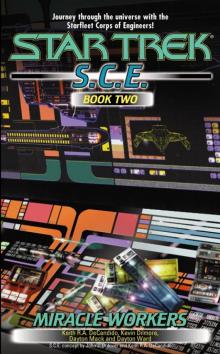 Miracle Workers
Miracle Workers Articles of the Federation
Articles of the Federation Supernatural Heart of the Dragon
Supernatural Heart of the Dragon War Stories: Book Two
War Stories: Book Two The Zoo Job
The Zoo Job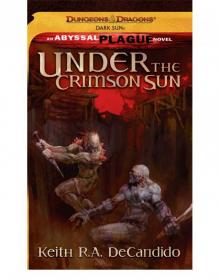 Under the Crimson Sun
Under the Crimson Sun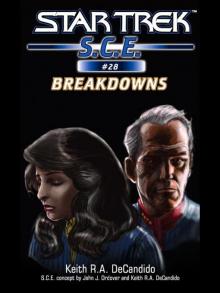 Breakdowns
Breakdowns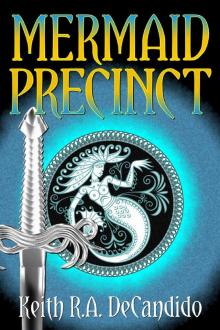 Mermaid Precinct (ARC)
Mermaid Precinct (ARC) Supernatural 1 - Nevermore
Supernatural 1 - Nevermore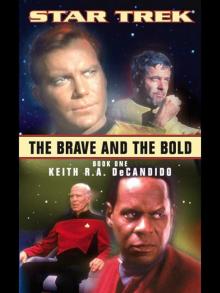 STAR TREK - The Brave and the Bold Book One
STAR TREK - The Brave and the Bold Book One Four Walls
Four Walls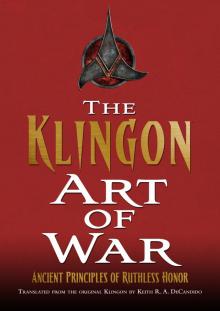 The Klingon Art of War
The Klingon Art of War Blackout
Blackout War Stories: Book One
War Stories: Book One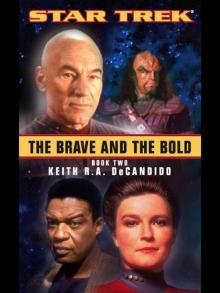 The Brave and the Bold Book Two
The Brave and the Bold Book Two Honor Bound
Honor Bound Sleepy Hollow: Children of the Revolution
Sleepy Hollow: Children of the Revolution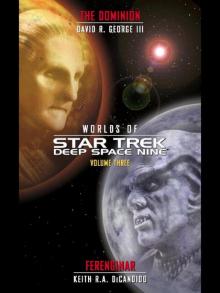 Worlds of Star Trek Deep Space Nine® Volume Three
Worlds of Star Trek Deep Space Nine® Volume Three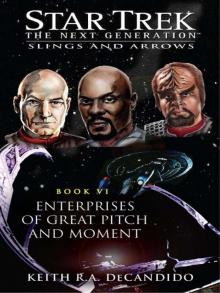 Star Trek: TNG: Enterprises of Great Pitch and Moment
Star Trek: TNG: Enterprises of Great Pitch and Moment Genesis
Genesis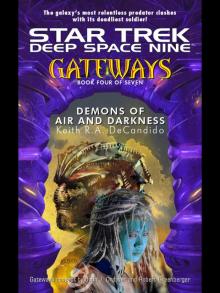 Demons of Air and Darkness
Demons of Air and Darkness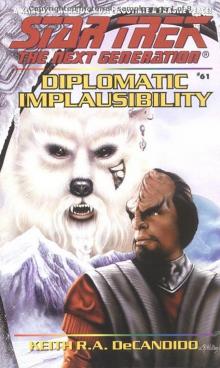 Star Trek - TNG - 61 - Diplomatic Implausibility
Star Trek - TNG - 61 - Diplomatic Implausibility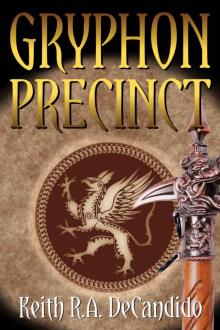 Gryphon Precinct (Dragon Precinct)
Gryphon Precinct (Dragon Precinct)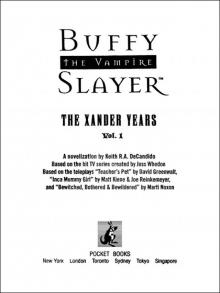 THE XANDER YEARS, Vol. 1
THE XANDER YEARS, Vol. 1 Nevermore
Nevermore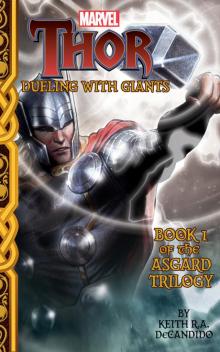 Thor
Thor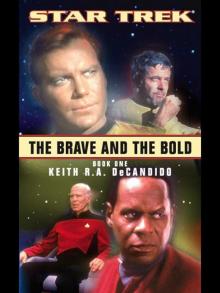 The Brave And The Bold Book One
The Brave And The Bold Book One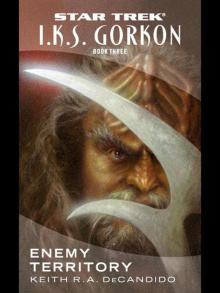 I.K.S. Gorkon Book Three
I.K.S. Gorkon Book Three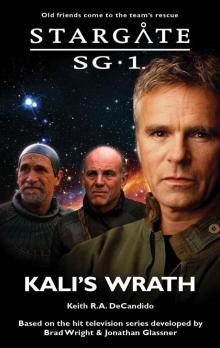 STARGATE SG-1: Kali's Wrath (SG1-28)
STARGATE SG-1: Kali's Wrath (SG1-28) Bone Key
Bone Key Guilt in Innocece
Guilt in Innocece Star Trek - DS9 Relaunch 04 - Gateways - 4 of 7 - Demons Of Air And Darkness
Star Trek - DS9 Relaunch 04 - Gateways - 4 of 7 - Demons Of Air And Darkness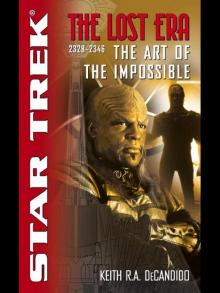 The Art of the Impossible
The Art of the Impossible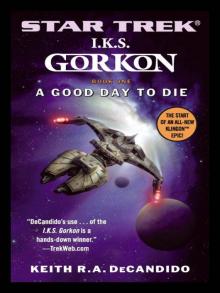 I.K.S. Gorkon Book One: A Good Day to Die
I.K.S. Gorkon Book One: A Good Day to Die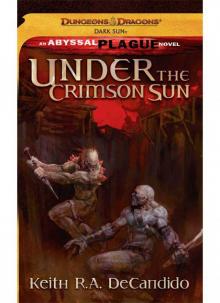 Under the Crimson Sun (the abyssal plague)
Under the Crimson Sun (the abyssal plague)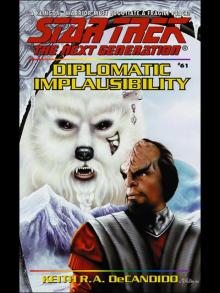 DIPLOMATIC IMPLAUSIBILITY
DIPLOMATIC IMPLAUSIBILITY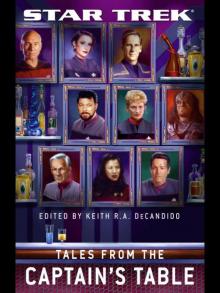 Tales from the Captain's Table
Tales from the Captain's Table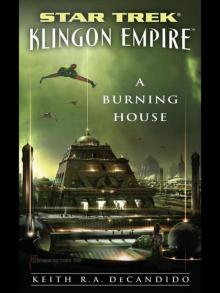 A Burning House
A Burning House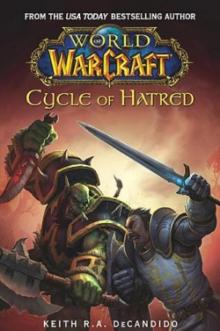 Cycle of Hatred (world of warcraft)
Cycle of Hatred (world of warcraft)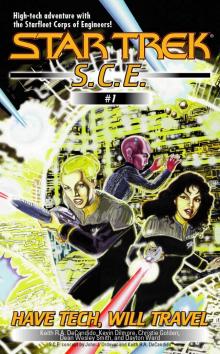 Have Tech, Will Travel
Have Tech, Will Travel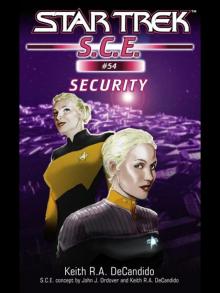 Security
Security